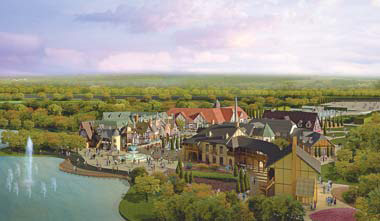Happiness abounds in the historical city
|
|
|
An artist's impression of the western architectural complex area in the Expo. |
Economy
The economic growth rate of Xi'an has been above 13 percent for the past several years.
The city benefited greatly from its unique food and folk culture, which, together with the fashionable lifestyles of the people in the city, have attracted lots of visitors from China and abroad.
Now the city has become the fourth largest international air transportation hub in China, with 27 international routes. The Xi'an North Station that is under construction will be Asia's largest railway station when it's completed.
The Xi'an International Port Zone is also expected to become China's largest inland port and bonded logistics center.
Research capacity has greatly boosted the city's economic development.
Xi'an has nearly 100 universities, close behind Beijing and Shanghai.
It also has more than 60 state-level key research projects and more than 130 state-level laboratories, research centers and test centers, generating about 10,000 items of scientific achievement each year.
It has more than 400,000 industry professionals and technicians including academicians of the Chinese Academy of Sciences and the Chinese Academy of Engineering, and experts who have made significant contributions to the country.
Daily life
The city topped the list of China's top 10 happiest cities in 2009, showing that Xi'an is a nice place to settle.
Forest covers 44.99 percent of the city's total area, and green coverage of its urban areas is 39.75 percent, making the city like a huge garden.
There is a forest belt covering 50,000 hectares around the city, and there are also more than 50 public green parks and 460 green squares in the city.
Some tourists say it is like walking in a south Chinese town instead of in a northwest Chinese city.
The Weihe River, Bashui River and the Chanhe River all go around or across the city, adding charm to the beauty of Xi'an and bringing pleasure to the people.
Eating in Xi'an is another great experience.
The cooking method of its 3,100-year-old steamed beef and mutton bubble has been listed in the national non-material cultural heritages.
About 100 of its traditional snacks have been named as China's famous snack brands.
Shopping malls, chain supermarkets and restaurants also make life very convenient for local residents as well as for visitors.
 0
0 







